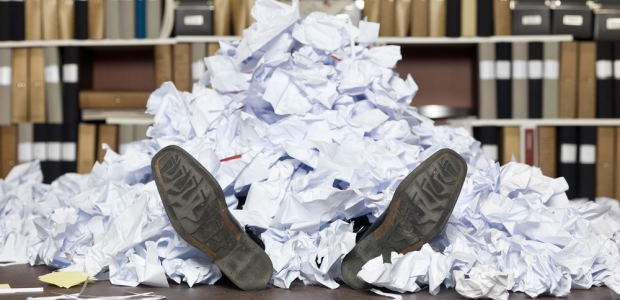
Paperless Government is an Environmental Imperative
- By Jonathon Ende
- May 08, 2018
By now, we should all be familiar with what it means to "Go Paperless." Virtually every industry, from banking to manufacturing, is striving to eliminate paper forms and processes, digitize documents, and generate greater efficiency in the process -- and the public sector is no exception. Government leaders are increasingly embracing the paperless revolution, to the benefit of their constituents and the environment as a whole.
The statistics show that paperless government has become as much an environmental imperative as a paperless private sector. The U.S. federal government currently spends $440 million per year on paper printing. Moreover, the majority of federal employees said that more than one-third of all paper forms they printed out were never actually used.
The overall environmental impact of going paperless is also becoming more apparent. The U.S. paper and pulp industry is the second-largest energy consumer in the country, so reducing paper consumption would substantially decrease our dependence on fossil fuels.
Here's more detail on why going paperless is a must for governments, along with steps they should consider taking in the near future to move in that direction.
Why Go Paperless?
Aside from the $440 million in government printing that goes to waste annually, the total government spends on paper is upwards of $1.3 billion. While not all of those forms would be considered "waste" by traditional standards, much of that printing could be digitized and streamlined to benefit the environment.
A huge part of the problem is that about 90 percent of government agencies don't have a formal printing policy, and 95 percent of offices don't require employees to enter a personal identification code to print. This lack of policy and accountability makes it difficult to prevent waste and, in some cases, actually incentivizes it, as employees may rely on printing as a means of habit or convenience.
The average federal government employee prints about 7,200 pages per year. To help eliminate this waste, some agencies are taking steps to reduce the amount of paper used on a day-to-day basis. The Social Security Administration, for example, is phasing out the mailing of paper checks to beneficiaries. The federal government has also issued certain U.S. savings bonds and treasuries that will be earmarked for eliminating paper processes, files, and storage facilities.
Aside from being environmentally friendly, governments should also recognize the public relations value of going paperless, as well as the benefit to the overall "citizen experience," in an era where physical forms are often viewed as outdated and antiquated.
What Governments Can Do Now
Governments that haven't already developed a roadmap to going paperless should consider doing so immediately. One of the first steps is integrating form digitization and automation into routine processes and services, such as revenue collection, permit applications, and back office administration.
Departments shouldn't try to "boil the ocean" in one fell swoop. Instead, they should focus on identifying specific areas where digitization can be quickly and effectively implemented. Eliminating one paper process at a time, over the course of months or years, can compound quickly and add up to a significant reduction in paper use. This strategy can also produce greater citizen engagement from constituents who expect a modern, digital-first experience.
Second, departments and agencies can begin implementing paperless forms and processes for financial processes such as billing, invoicing, and payroll. This can be either for direct employees, outside vendors, or government contractors. Utility giant Con Edison is one good example for governments to examine, as they reduced paper billing usage by upwards of 20 percent when they gave customers the ability to pay online.
EPA also cites billing and e-payables as one of the key areas that agencies can eliminate paper and have a substantially positive environmental impact. Every agency or department deals with finance, billing, and payroll in some way, so this is often a great place to start in the push towards paperless.
Finally, much of the paper waste and negative environmental impact comes from the need to store documents and forms. While many other industries have highly secure servers either on-premise or in the cloud, governments often still rely on physical document storage in filing cabinets.
Governments should take steps towards shoring up their data security so that more files can be converted from paper and stored digitally. Implementing information redaction for digital files, for instance, would eliminate the need to store paper copies of sensitive information. Guaranteeing secure digital storage would also eliminate the need to physically send files between agencies, such as the FBI and local police offices, which would cut back on paper resources inherent to the mailing process. Governments should also look at solutions like the elimination of scanning and faxing and the use of internal digital collaboration tools to make strides towards a more sustainable, paperless way of doing the people’s business.
Governments that continue to use paper at their present volume are missing a crucial opportunity to practice environmental responsibility. By realizing the importance of the problem and taking some of the steps outlined above, governments can set themselves on the right path toward making the planet greener and their citizens happier.
About the Author
As the CEO and Founder of SeamlessDocs, Jonathon Ende (JE@seamlessdocs.com) helps governments of all sizes leverage digital tools to make their services more efficient, accessible, and beautiful. He has been honored by the GREAT Tech Awards, winning a grant from the British Government and even receiving the award from Prince William and Mayor DeBlasio of NYC. His other awards and recognitions include the prestigious NextCity Vanguard Award, the $100K Grand Prize at TechWeek NYC, and the Code for America Technology Award for Government Innovation. Jonathon has been appointed to fellowships and memberships by the Entrepreneur Roundtable Accelerator, Code for America Accelerator, NYEDC, and the 92Y. He is currently a member of the Urban.Us, 1776, and Govtech Fund portfolio and networks.